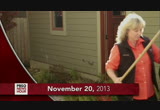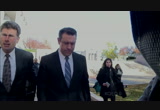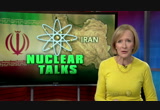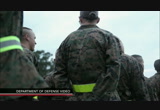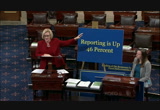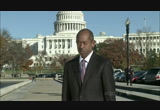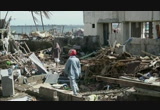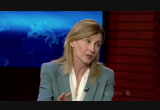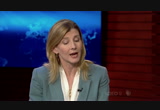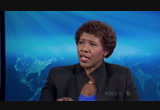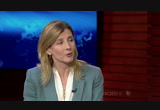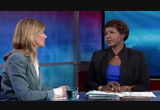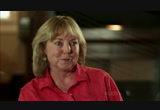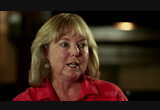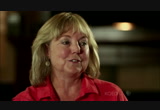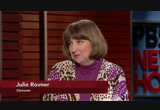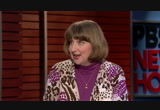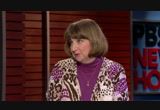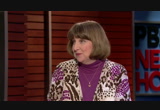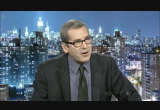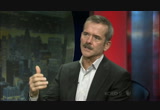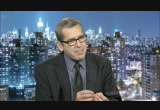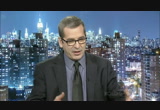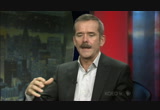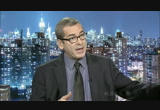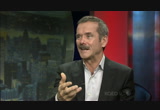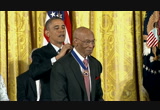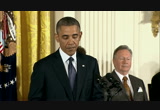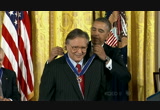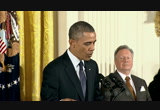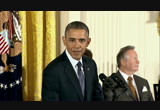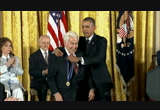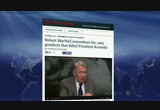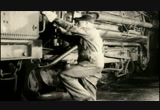tv PBS News Hour PBS November 20, 2013 6:00pm-7:01pm PST
6:00 pm
captioning sponsored by macneil/lehrer productions >> woodruff: iran's supreme leader expressed support, albeit limited, for the negotiations over his country's nuclear program, just as a new round of talks kicks off in geneva. good evening, i'm judy woodruff. >> ifill: and i'm gwen ifill. also ahead this wednesday, the last in our series of personal stories from health reform: a denver woman whose insurance policy was cancelled. >> i was planning to keep this plan for the future. this was not a substandard plan. this was a plan that was good for me. >> woodruff: and miles o'brien sits down with chris hadfield, the astronaut whose out-of-this- world dispatches shed light on life in space.
6:01 pm
>> i could take a picture and within minutes, tweet it to a million people. it just finally allowed me to really share the experience with many people who wanted to come on board. >> woodruff: those are just some of the stories we're covering on tonight's "pbs newshour." >> major funding for the pbs newshour has been provided by: >> supported by the john d. and catherine t. macarthur foundation. committed to building a more just, verdant and peaceful world. more information at macfound.org >> and with the ongoing support of these institutions and foundations. and... >> this program was made possible by the corporation for public broadcasting. and by contributions to your pbs station from viewers like you. thank you.
6:02 pm
>> ifill: the united states and five other world powers resumed talks with iran today over reining in its nuclear program. negotiators gathered in geneva, while in tehran, iran's supreme leader, ayatollah khamenei said his country is willing to negotiate, but will not be cowed by sanctions. >> ( translated ): they have decided to the pressure the iranian nation, hoping they might manage to make them surrender. they are wrong. the iranian nation will not surrender to anyone due to >> ifill: khamenei said there are red lines that iran's negotiators will not cross, but he gave no details. we'll talk to margaret warner in geneva, right after this news summary. a series of bombs exploded across baghdad today, killing at least 35 iraqis and wounding more than 100. the targets were in mostly shi- ite commercial areas around the capital. five were in parked cars, and at least three were detonated by a
6:03 pm
remote control. 244 people have died in attacks in iraq this month alone. in egypt, 11 off-duty soldiers were killed in a suicide car bomb attack in northern sinai. 37 others were wounded. the attacker rammed his vehicle into a convoy of buses as they traveled between rafah and el- arish. the blast scattered mangled wreckage across the desert. it was one of the deadliest attacks since president mohammed morsi was ousted in july. the u.s. and afghanistan have reached an agreement governing american troops and contractors who stay past 2014, when the official nato combat mission ends. it sets out troop numbers and conditions under which they'll operate. secretary of state john kerry confirmed today that a deal was reached, but he gave no details. he also denied reports that the u.s. will apologize for civilian deaths. >> let me be clear. president karzai didn't ask for an apology, there was no discussion of an apology.
6:04 pm
there will be... there is no... i mean, it's just not even on the table. we have agreed to language to be submitted to a loya jirga and they have to pass it. >> ifill: the loya jirga, or gathering of afghan elders, opens tomorrow in kabul. joseph paul franklin, a serial killer who targeted blacks and jews in the late 1970s, has been put to death in missouri. he was executed by lethal injection this morning. in addition to the murders, franklin admitted shooting civil rights leader vernon jordan, who survived the attack and "hustler" magazine publisher larry flynt, who was paralyzed from the waist down. florida congressman trey radel pleaded guilty today to misdemeanor cocaine possession. he was given one year's probation. the republican freshman left a washington courthouse without speaking to reporters. he gave no indication of whether he'll stay in office. last night, radel said he's seeking treatment for alcoholism.
6:05 pm
wall street pulled back today. the dow jones industrial average lost 66 points to close at 15,900. the nasdaq fell ten points to close at 3,921. >> ifill: still ahead on the "newshour": the new push to curb iran's nukes; debating what to do about sexual assaults in the military; the challenge of delivering aid to the philippines; the story of one woman who is losing health insurance she liked; chris hadfield's viral videos from space and the medal of freedom for bill clinton, loretta lynn, oprah and more. >> woodruff: as pressure builds from critics of a nuclear deal with iran, negotiators are back in geneva for another round of talks. our chief foreign affairs correspondent margaret warner is also there. i spoke to her a short time ago. margaret, hello. so is there any movement
6:06 pm
reported today? >> warner: judy, that's a fascinating question that's hard to answer. there was a flurry of activity under secretary wendy sherm man. the whole u.s. delegation flew overnight and jumped into talks with their russian and chinese counter parts, no doubt to avoid the kind of disagreement that sunk it last time. when lady catherine ashton, and foreign minister shareach had lunch today they came out saying we're not talking about substance of any draft right now. we're talking about progress. this is the third round of negotiations and you would think process questions would have been settled some time ago. it appears as if they had to reset the starting point to some degree. >> woodruff: how would you describe the atmosphere? what are people saying outside the meeting, around what's going on there? >> warner: well, judy, the feeling was from people here but also, i think, in respective
6:07 pm
capitals, that everyone came into this with high expectations, and a kind of a sensthat this was the week that they'd clinch this first step on the way to a comprehensive deal. but today, there were definitely some sour notes. i mean, lady ashton said the lunch was very positive, but there was great attention given to the fiery speech by supreme leader khamenei, in which he said there had been red lines established, that the iranian delegation could not cross. and after this lunch, as i said, that lady ashton said was positive, the deputy iran foreign minister said the reason we're not talking substance yet is there is trust thaft broken that has to be rebuilt. so the iranians even late tonight were telling me that there is a sense of mistrust, and that we hope we'll get to the substance tomorrow. >> woodruff: well, we know the last round of talks did not end as many had wanted them to in
6:08 pm
the administration. has-- how much of a shadow has that cast over the talks taking place now? >> warner: a huge shadow, judy. first of all, clearly the expulz iranians and really everyone wants to avoid the embarrassment of last time, when the u.s. and iran appeared close to the outlinesave deal, and then all the other foreign ministers came in and the french raised sudden objections. in fact, we had an interesting little tidbit about this today, that the u.s. hinted expat the eu spokesman confirmed that lady ashton only invited secretary kerry and the foreign ministers hearing of this decided they would come. the other reason they want to avoid another setback, in the interim critics any of potential deal have really gained ground, especially certainly in washington. and right now, israeli prime minister benjamin netanyahu is in russia lobbying president putin against the deal.
6:09 pm
so even though u.s. officials say-- said tonight at a briefing we're not in a rush to get any deal, i do sense from them a feeling of urgency, that if this first step process goes on too much longer it could get dragged down by critics at home, especially with new congressional sanctions. >> warner: margaret, you mentioned, the rawpses speaking about a break in the trust between the two countries, and that that trust has to be built back up again. how is the u.s. responding to that? >> warner: well, we asked this tonight, and one u.s. official pulled me aside and said really that's a negotiating tactic, but the senior u.s. official briefing us said, when asked about it, it's been tough. and that there are real moments of tension, and this official went on to say we have critics and skeptiction domestically, we all do. this is a very eye don't remember the exact words-- but this is a very difficult thing
6:10 pm
for us all to do. to some degree, i would say they sidestepped the question did of but did not dispute it. >> woodruff: so given all this, margaret, how would you describe expectations? >> warner: i think the moment's being prepared for secretary kerry and others to fly in. but definitely tonight, the tone of briefings from both iranian and american officials was much more cautious than at this point in the last round. and each one had the tone of someone who doesn't want to get burned again. gl. >> woodruff: margaret warnener geneva, and we will check in with you again tomorrow. >> warner: look forward to it, judy. >> ifill: with every new report of the shockingly high incidence of sexual assault in the military comes new debate over how to end it. today's played out on the floor of the united states senate, as lawmakers prepared to vote on
6:11 pm
legislation that would fundamentally change how the military prosecutes its own. "newshour" congressional correspondent kwame holman reports. >> sexual assault is not new, but it has been allowed to fester in the shadows for far too long. >> reporter: new york democrat kirsten gillibrand led off the debate with an impassioned appeal to change the way the military deals with sexual assaults. and women find themselves in the fight of their lives, not on some far off battlefield against an enemy, but right here within our own soil, within their own ranks, with their commanding officers as victims of horrible acts of sexual violence. >> reporter: gillibrand's amendment to the defense authorization bill would strip commanders of the power to decide whether to prosecute service members accused of serious crimes including rape and sexual assault, instead that authority would be given to a corps of trained prosecutors. >> and so when that commander looking at the case file says,
6:12 pm
"ah, you know, can't possibly have happened, didn't happen this way," he weighs the evidence differently, differently than someone objective, who's trained, who actually knows the difference in these crimes and who knows what a rape is. they know that a rape is not a crime of romance. they know that a rape is a crime of dominance. >> reporter: but in a sharply divided senate, missouri democrat claire mccaskill warned that taking immediate commanders out of the loop actually gives victims less protection. >> now use common sense. you're back in your unit; you have been assaulted, which way are you going to have more protection? if a group of colonels half a continent away are looking at the facts of the case or if your commander has signed off? of course if your commander has signed off, because that sends a message to the unit, we're getting to the bottom of this.
6:13 pm
>> reporter: mccaskill wants to keep prosecution decisions with commanders, but limit their ability to overturn convictions in such cases. and, there would be civilian review of decisions not to prosecute. >> it strengthens the role of the prosecutor because it provides another layer of review. it increases accountability of commanders making this evaluation on their forms and adding that other layer of review. >> reporter: the push for congressional action was fueled by a pentagon survey that estimated 26,000 service members experienced unwanted sexual contact, from touching to rape, last year, but only 3,400 of them were willing to report it. since then, new data found reports have jumped 50%. it's unclear if that signifies an actual increase in assaults, or in reporting. military leaders have steadfastly opposed any move to strip commanders of prosecutorial decisions, as the joint chiefs made clear in june. >> without equivocation i
6:14 pm
believe that maintaining the central role of commander in our military justice system is absolutely critical to any solution. >> reporter: the chiefs say the army, navy, air force and marines are already taking steps to address the problem, including increased training on sexual assault awareness and prevention. >> ifill: it's been nearly two weeks since typhoon haiyan slammed into the philippines leaving thousands dead and millions in need of aid. tonight, we look at the challenge of helping those most affected by the deadly storm. the familiar sounds of the market meant signs of life were returning today to devastated tacloban. the coastal city of 220,000 lay squarely in the typhoon's path when it blasted through the central philippines nearly three weeks ago. some of the vendors returning to the streets freely admit their
6:15 pm
wares were stolen goods, lifted from other stores and establishments during the time residents were cut off from aid and supplies. >> ( translated ): what we did was loot, because we were worried that we would have nothing to sell. but when we started selling what we looted-- canned goods, groceries, anything-- we were very happy that it all sold. then we had hope. >> ifill: others, equally resourceful, have begun using discarded refrigerators as makeshift fishing vessels. elsewhere, thousands of people of all ages, continue combing the debris, trying to salvage what they can. even as bodies are being counted, identified and hauled away. the official death count now stands at just over 4,000 with 1,600 missing. meanwhile, aid by the truckload is starting to arrive in remote areas like eastern samar province.
6:16 pm
>> slowly, slowly we are reaching the different affected population in the different areas. >> ifill: the aid comes from the united states, thailand, japan, and australia as well as france and britain. china announced today it's sending an emergency medical team and naval hospital ship. the chinese had been criticized for doing little until now. foreign governments have now pledged about $320 billion in aid. but the sheer scope of the devastation remains a huge obstacle. >> we are identifying areas of need on a daily basis. >> ifill: in manila yesterday the head of the u.n.'s world food program outlined the problems confronting the relief effort. >> the challenges of the philippines are primarily geographical challenges, this being an island nation and the logistics challenges of reaching out to different pockets of small communities here make this >> ifill: so far, the u-n says it has reached 1.9 million people out of the estimated 2.5
6:17 pm
million still in need of food. nancy lindborg, the assistant administrator for humanitarian assistance at the u.s. agency for international development, is just back from the epicenter of the disaster. she joins us now. welcome. >> thank you, gwen. >> so give me a sense in the two weeks since the typhoon hit, what has been done and what remains to be done? >> we were tracking the storm a week before it hit and had teams prepositioned in manila. it took a couple of days, but we were able-- working closely with the u.s. military to be one of the first governments getting in there with airlifted supplies. when i arrived on saturday, we have a full up-tempo relief operation under way with an air bridge by the u.s. military. we've got supplies coming in on a steady stream from our regional warehouses. we have focused the u.s. government on setting up logistics systems that can get
6:18 pm
to some of these more remote areas, bringing in shelter, emergency shelter, life-saving food, setting up clean water systems, working with unicef. we focused on getting the museum water system back up and running in tacloban, which is now-- which is reaching 100% of city residents. >> ifill: what is the biggest challenge-- you mentioned water, sanitation, logistics. what is the biggest barrier to getting things done? >> the biggest barrier has been the logistical challenges. the airports, the roads initially were all inaccessible. and so what has happened now is most of the major arteries are cled away. the airports and the seaports are working, not perfectly, but we're able to get that supply chain operating and we're focused on moving life-saving supplies through those logistical systems. >> ifill: you have been on the ground for many of these types of disasters in the past. as you watched this one and
6:19 pm
compared torg ones you've seen, what is the most effective kind of aid that comes in these early dade daze? >> first of all, we had extraordinary coordination across the u.s. government. u.s. aid working closely with our military, and closely with the government of the philippines. unfortunately, that's a government that has a lot of experience with responding to disasters? they have had 26 named storms this year alone. >> ifill: this year. >> they have run through the alphabet, a throughz. that's the level of battering weather they experience. >> ifill: that makes this europe the worst on record? >> the worst since 1993. and the month ahead is the worst storm season typically. we worked very closely with the government of the philippines to increase their preparedness and their ability to respond, which is some of what you saw with the level of evacuation in advance of the storm. and the coordination that has emerged on the ground to get distribution out to remote areas. >> ifill: glen we saw all of the aid that is coming from
6:20 pm
countries around the world. which is most useful, direct cash or food aid? >> you know, it's always looking at what is the context. this was a vast swath storm plus the surge of water affected 13 million people. in the epicenter of tacloban, where we're focused, it's too early for cash to be given out. so we're focusing on urgent life-saving shelter, food, clean water, hygiene kits so people have soap. people have lost everything. they are dealing with a life-changing set of losses. we will move as quickly as possible to more early recovery and helping people get back up on their feet. >> ifill: in other disasters in prior recovery efforts, like in haiti, comes to mind, a lot of effort put in, a lot of money, a lot of logistical help from around the world and it emerges later it didn't have its desired effect. how do you guard against that
6:21 pm
happening here? >> the most important business is in the philippines you have a much more capable government that is used to dealing with forms. >> ifill: there is an infrastructure, a government at infrastructure that still exists. >> at every level. i vaiftd command center that the local government has set up in the middle of tacloban city, tacloban, which is humming with hundreds of philippine volunteers assembling family packs. we were able, using our flexible food assistance money, to locally procure right roois to go into those packs. they've already got that system up and running. there's a remarkable resilience at the community level, the local government, and at the national government. >> ifill: does that resilience also extend to rebillion or is it too soon to start talking about looking forward in that way? >> rebuilding was also the hardest. that's when people stop paying attention and the crams go away. i invite you, gwen, to ask that question, look at how this is going six months from now. that's the long, hard work of
6:22 pm
rebuilding and helping people really recibdle hope and fe geta future again. >> ifill: is it also part of the rebuilding, the future-oriented process to find ways to prepare for this type of attack, obslaught again? >> absolutely. u.s.a. d. responded on rebuilding resilience, as we have look that increased tempo of extreme weather. it's everything from rice seeds that are resistant to salt water. it's-- when you walk around tacloban, you see the structures that are still standing were of better materials and better built. we can help those communities build more storm-resistant structures. >> ifill: and what does happen? you just alluded to this-- what does happen when we all inevitably look away? >> we won't look away. the's government is committed to staying in a supportive role and to help with that reconstruction
6:23 pm
process prs. we're already focused on what are the ways to move into early recovery, and to take what is our a.i.d. program and help adjust it. that's the longest, hardest part of this journey, and it's critical that people stay engaged. >> ifillengaged. >> ifill: nancy lindborg at the u.s. agency for economic development. thanks for coming back. >> thanks for having me, gwen. >> woodruff: now, the latest on the president's moves to deal with the cancellations of health insurance policies and the challenges of trying to fix it. state insurance commissioners, who will play a big role in all this, met with president obama this afternoon. and that brings us back to our series on the impact of the affordable care act as people learn more of the details. tonight, we have the story of a colorado woman whose plan has been cancelled. >> my name is kathleen baker.
6:24 pm
i work part time in the real estate industry here in denver. and i've had an individual health insurance policy for the last six years. i'm insured with kaiser permanente and i've found the quality of their care to be perfect. excellent. in many ways, better than i could have expected. i'm a fairly healthy person, so most of all, i go to them once a year for my annual visit. the few times i've needed to see them in addition to that, they've always been very responsive. i was planning to keep this plan for the future. i had hoped, that as had been said, that if you had an existing policy that you were happy with that you could keep it. i, of course, was one of the millions of americans who got a letter that said my policy was not one of those that i could keep. because of the affordable care act, your current policy will end december 31.
6:25 pm
they gave me what my options were. they told me in that letter, which policy going forward they thought was the most comparable to the one i had historically. the differences in the plan that is available to me now is that the monthly premium has gone up by 17%. that by itself is really not that bad. what's otherwise bad is that i had an annual deductible of $3,000. the closest to that is to have a $4,500 deductible. my previous deductible was also my total out-of-pocket expense maximum. going forward the annual maximum out-of-pocket is going to be $6,350. now that's 112% of my prior amount. if i add my premiums together with my maximum potential out- of-pocket expenses, it's about a 67% increase. i know the president and the
6:26 pm
administration said-- and i presume if they said it, they believe it-- that these plans were substandard. this was not a substandard plan. this was a plan that was good for me. now, i have to have a higher premium plan, a higher potential out-of-pocket maximum on an annual basis. i cannot put that money in a i don't see how this is a better plan for me. when i saw that the healthcare bill had been passed, i really presumed that because it had i really believed i would be able to keep my health plan. i don't like to participate in conspiracy theories, but i do believe that because of the economics of how the plan works, they need a number of people who under-utilize services but pay for those services, to go onto the exchanges.
6:27 pm
in order for that to happen, if they cancel my plan and i go onto the exchange, the economics of that is that someone else who does use health care services more often will be subsidized through me. i understand that that's how it works. i expected that i would be paying something more. i don't know how we can pay for all those who are uninsured without some of us paying more. i didn't expect a 61% increase to my health care costs. i think that's a lot higher than any of us could have expected. i have written to all of my congressmen. i am hoping that i will hear back from them. and i have until december 15 and i'm hoping at the very least, since they're not going to roll back obamacare, i'm hoping they at least go with their promise and allow those of us who had plans we liked to keep them.
6:28 pm
>> woodruff: we checked back with kathleen baker and she says she does not know yet whether her insurer will now let her stay with her current plan. even if that were to happen, she told us, she's concerned the president's action only buys her one more year before another likely cancellation. we try to fill out the bigger picture again. and julie rovner of npr is back with us to help. welcome back. >> nice to be here. >> woodruff: so it is understandable why kathleen baker is upset, 61% increase in what she would pay. what is your sense? what's our understanding of the likelihood that she'll be able to keep the current policy? >> we really don't know. this was something, of course, the president tried to sort of plug in last week, as a way to try to at least not make good on his promise try to make a little better on his promise. it's very complicated. he started out if you like your plan you can keep it. and then if you like your plan you can keep it maybe one more year and if your insurance
6:29 pm
company says so, and then it became if your insurance company says so but if your state insurer says so and now maybe not that. >> woodruff: the president met with some state insurance commissioners. how are they reacting? they have they have some stay. >> they're reacting all across the board. only a hand full of states have really said. it turns out it's even more complicated than the insurance commissioners deciding. in some number of states-- we don't know the exact number but it seems to be about a dozen-- the states have written bointo either their state laws or state regulations these same requirements to mir ort federal requirements, that after january 1, 2014, insurance companies can no longer sell or renew policies that are not in compliance with these new federal rules. so even if the state insurance commissioners wanted to say, "another you can have another year," they can't because their hands are tied by their own state laws and regulations. so it becomes that much more difficult to basically uncancel
6:30 pm
these canceled policies. >> woodruff: it look as if some of the states that were trying to go along with the president and the health care law are the very states who are now saying we can't double back and make changes. >> that's right. and there are reasons. i mean some of them are practical, but it's very difficult in a short amount of time between now and january 1 to do this. but it's also because they're worried about the risk pools. and i think, you know, that basically the-- our woman from colorado is correct. in some cases, they are asking healthy people to pay more to help offset the cost of those sick people, and they're worried if it's the healthy people who have been paying leswho keep their plans, who keep these plans for another year, thatwill be only sick people in the risk pool and for 2015, insurers will raise their rates. that will make healthy people not anxious to signed up and then you get into that terrible insurance death spiral we have heard so much about. >> woodruff: we talked about the comirgz, julie. how about the insurance companies? how are they deal with? >> they have also been all over
6:31 pm
the place. in florida a number of insurance companies have said, yes, they will uncancel these plans. but a lot of them, again, have beeworried more about the practicality. they have to send more letters. they have to give people a choice of other plans or keeping their plans, going on the exchange. they basically spent most of this past year setting up new plabz, setting up their software networks. it would be extremely difficult for them to undo all of this in that short a period of time, even they were allowed to. they have to go back to state regulators if they're going to offer these plabz for another year, they would probably want to get rate adjustments. they have to go to regulators to get permission for that. all of this, again, is very, very difficult. gloold and is there a timetable here? is there a date by which they really have to make a decision? >> well, if they've canceled these plabz starting january 1, that would be the date. on the exchanges you have to purchase a plan by december 15 in order to have coverage begin january 1. we're really talking about that short a window now.
6:32 pm
it's toward the end of november. you have to at least in the exchange select your coverage by december 15. that's getting to be a really short amount of time. >> woodruff: let's talk about the administration's other big headache, and that is the web site, which has been a problem from the beginning of the rollout in october. there was some testimony on capitol hill yesterday, a little bit of new information, what does it look like? >> well, of course, what we learned yesterday is that there are parts of the web site, particularly some of the backend parts of the web site, or they called them the "not consumer facing parts of the web site" that are not basically yet built, and they are saying these are the things to connect some of the payments to some of the insurers, things that won't necessarily be needed quite yes yt, because after all, payments don't start coming in until the middle of december, january. >> woodruff: is that something they're confident can be fixed? >> that's what they're saying, but of course they've been confident that all of this could be fixed. one of the i weries today is the web site has been down most of the day today. secretary sebelius was off doing a demonstration.
6:33 pm
she tried to get on the web site and found the web site was down. >> woodruff: so the promise or the comment from a couple of weeks ago that it will be available and usable for most people who try to use it by the end of november, what are they saying? >> that is still what they're saying. what they're saying is the people for whom it nol the be available and usable by the end of november are mostly people who have-- not because the witness won't be working but because they have individual situations that are such that they will need to go to specialists. they will need to make a call. they'll need other kinds of help. they do insist they're going to have this ready and running ?ooghtly, but that's basically just a week and a couple of days away from now. >> woodruff: we are really glad to have you here to help us walk through all. this. julie rovner from npr, thank you. >> you're welcome. >> ifill: talk to people who work in the space business, and
6:34 pm
you'll often hear worry that the public is losing interest in the space program. but earlier this year, a canadian astronaut helped change that, at least for a while, by taking advantage of the digital age to provide a unique look at what life is like in orbit. "newshour" science correspondent miles o'brien has a conversation with chris hadfield from our new york studio. >> that's one small step for man, one giant leap for mankind. >> reporter: there was a time when astronauts were global super storrs household names. those days may be gone, but one recently retired has managed to cut through the clutter and make an extraordinary connection between life on and off the planet. ♪ and the papers want to know whose shirts you wear ♪ . >> his out of the world cover of david bowie's song went viral.
6:35 pm
before he released the video he set himself apart by performing accompaniment to artist likes neal young and bear naked ladies and made video videos that offed fascinating slices of life in the world of microgravity, where even the mundane is worth exploring. how do you trim your fingernails? hadfield has a video how-to. >> that one got away. >> reporter: he is a star on twit wer about one money disperlz generally goes out of his way to share the experience of leaving the planet. his latest effort is a memoir entitled "an astronaut's guide to life on earth-- what going to space taught me about ingenuitiy, determination, and being prepared for anything." corm chris hadfield, welcome. >> thanks very much, miles. >> not every ?awnt make astronat a priority to share their experience with the public. >> i have from the beginning. i flew in space three times, and
6:36 pm
i was a kid growing up who would have loved the opportunity to meet an astronaut or get more insight. i wrote to nasa for them to mail me stuff and i watched what the apollo astronauts did, and it kind of set really strongly in me, that if i ever get an opportunity to do something like this, i'm going to do everything i can to share it with people. this last time, having internet connectist, have wide wanded width where we sowld send video down where i could take a picture and share it with a million people finally allowed me to share the experience with as many people who wanted to come on board. >> reporter: how much of this was serendipity and how much was planned? it looks in retrospect a pretty concerted effort to build a following for space and you, too. >> the canadian space agency recognized this was going to be a great chance to show people what it is like to live in space, so a couple of years before flight they gave me a video camera and they said, "as you're going through traipg,
6:37 pm
make little videos and we'll learn together how to turn out little youtube clips." when i got to orbit i sort of had the idea i'd do it but we didn't really have a big plan and one day i opened up a can of peanuts, i peeled that back that little sort of foil lid and it looked like it was full of cockroaches. and i thought if that cool to us, this will look cool to everybody. i grabbed an ipad, did a film of it, sent it to the ground, the c.a.s. put and up and millions of people lookedda it. it was very snow ballish and grew on itself and the results were huge. >> reporter: what's the lesson of the peanuts and fingernails? is that there's no amount of minutia too small when it comes to being in space or people are focused on stuff that really isn't that important in the grand scheme? >> people want to know what it's
6:38 pm
like in space. you and i have talked about space for a long time. i've gone to thousands of places to go talk about space flight, and people always want to know, what is it like? how do you go to the bathroom? what happens if you sneeze? what happens if, everything, how do you use the toilet, how to you make lunch? the real motivation is how does that matter? and that's what i tried to do the whole time up there was to show them, hey, this is cool, this is fun, but meanwhile you're coming on board a space station that will show you if i float a ball of water with pepper oil in it, think about what you could do with that experiment. think about what this environment could allow you to do, everything from taking frastles of the earth to maybe recording a rock video. >> reporter: aside from the amazing pictures of floating peanuts, fingernails, and an amazing cover of david bowie's music, give us a justification for this space station, $100 billion spent. >> sure. >> reporter: do you feel like the taxpayers should feel good
6:39 pm
about this? >> oh, yeah, absolutely. i mean, if you pull a number out of the air like $100 billion spent, you have to put it in context, right? what else over that length of time, over the 20-plus years we've been working on space station, what are all the other things we spent money on? otherwise, it's a number that just becomes sort ofap out-of-reference thing. let's just talk about space station. countries that were enemies within living memory-- germany, japan, russia, the u.s., and canada, and all across europe, doing something that rises above the day-to-day squabbles of life. giving ourselves sort of a common enemy of complexity and cost. it's really the only way a space station like that could get built. it has to be international because it's such a long-term thing. it serves a great function of a symbol of what can happen when you do things right. it's also a laboratory, and a laboratory like none we've ever built. there are, like, 200 experiments running up there, everything
6:40 pm
from a device that we invented that can do blood analysis in 10 minutes, and a thing the size of a shoe box or a toaster right through to looking at nanoparticles and how they behave in magnetic fields so we can use them for shock absorbedders and holding up buildings and earthquakes. and a spectrometer trying to understand what the whole universe is made of. we don't know what 95% of the universe is even made of, and we can figure that out, hopefully, using the space station. so it is both a great source of invention and research. but also an unbeatable point of inspiration for the planet. >> reporter: final question-- you're now on the sidelines, retired after an illustrious career in space. and you've had a little bit of time to think, i think, about where we've been and where we're going. when i say "we" i mean that collectively. where should we be going in space? >> you know, when i'm trying to predict the future, i try to
6:41 pm
look at the past and look for examples, and the way we've always done it, is we kind of send out a probe to see what might be there, get a feel for what's possible, see if it will sustain us and then we start moving there. it's natural. it's what we've done in space so far. we sent out the earliest to see if we could sustain suborbital and then orbital. and then we start the building skylab, and we built space station and now we moved to earth, in lower earth orbit, and to me the obvious next step-- the beaut of space station is we can bail out and be home in a couple of hours. the obvious next step, i think, is the moon. it's three days away. we have so much we need to invent before we go further out into the solar system. how do you generate power? how do you navigate. how do you do all those things? and the moon, if things all go to hell in a handbasket we can get in and be home in three days. to me the obvious next choice, beyond the space station, would be go to the moon and once we
6:42 pm
learn everything there go further. >> reporter: sothose who say, "been there, done that" what do you say? >> been there, done that? that would mean the reason we went to the moon was purely for entertainment and that's not why we explored. that's not how we settled anywhere. that would be like columbus going across the atlantic saying there is a whole continent here and there's no reason to come back because i've been here once. that's not human nature. nonetheless@not our pattern and won't be our pattern in space. >> correspond chris hadfield, thank you very much. >> thanks, miles. >> ifill: online, what does space smell like? is the movie "gravity" realistic? commander hadfield answered your questions from social media. that's on our homepage. >> woodruff: finally tonight, honoring the accomplishments of notable americans with the presidential medal of freedom. it's the highest civilian award
6:43 pm
given in the united states. john f. kennedy first proposed the medal 50 years ago but he died before he could present it to anyone. today, following in the tradition of every president since then, president obama bestowed the honor to a diverse group in the east room of the white house. >> on behalf of michele and myself, welcome to the white house. >> woodruff: musicians, scientists and politicians were among those honored. the group also included: ben bradlee, who oversaw the "washington post's" coverage of the watergate scandal; the late astronaut sally ride, whose longtime partner accepted on her behalf and mario molina, who won the nobel prize in chemistry for his work on how pollutants deplete the ozone layer. sports heroes were honored, including hall of famer and chicago cubs great ernie banks. >> a man who came up through the negro leagues making $7 a day and became the first black player to suit for the cubs and
6:44 pm
one of the greatest hitters of all time. ernie became known as much for his 512 home runs as for his cheer and his optimism and his eternal faith someday the cubs would go all the way. ( laughter ) >> woodruff: the university of north carolina's legendary basketball coach dean smith wasn't able to attend but his wife did. >> dean smith is one of the winningest coaches in college basketball history, but his successes go far beyond "x's" and "o's." even as he won 78% of his games, he graduated 96% of his players. while coach smith couldn't join us today due... due to an illness that he's facing with extraordinary courage, we also honor his courage in helping to change our country. he recruited the first black scholarship athlete to north carolina and helped integrate a restaurant and a neighborhood in chapel hill. that's the kind of character that he represented on and off
6:45 pm
the court. >> woodruff: the president paid tribute to a jazz great and a country music legend. >> loretta lynn was 19 the first time she won the big. she won big at the local fair. her canned vegetables brought home 17 blue ribbons. ( laughter ) and made her canner of the year. for a girl from butcher holler, kentucky, that was fame. fortunately for all of us, she decided to try her hand at things other than canning. her first guitar costs $17 and with it, this coal miner's daughter gave voice to a generation, singing what no one wanted to talk about and saying what no one wanted to think about. as a young man in cuba, arturo sandoval loved jazz so much it landed him in jail. it was the cold war, and the only radio station where he could hear jazz was the voice of america, which was dangerous to listen to.
6:46 pm
but arturo listened anyway. later he defected to the united states, knowing he might never see his parents or beloved homeland again. without freedom, he said, there is no life. and today arturo is an american citizen and one of the most celebrated trumpet players in the world. >> woodruff: this year marks the 50th anniversary for several pivotal moments in civil rights history. mr. obama honored two notable figures-- the reverend c.t. vivian, a leader in the movement and the late bayard rustin, who helped organize the 1963 march on washington. his partner was on hand. >> bayard had an unshakable optimism, nerves of steel, and most importantly, a faith that if the cause is just and people are organized nothing can stand in our way. for decades, this great leader, often at dr. king's side, was denied his rightful place in history because he was openly gay. no medal can change that, but
6:47 pm
today we honor bayard rustin's memory by taking our place in his march towards true equality, no matter who we are or who we love. >> woodruff: a pioneer of the women's movement was celebrated as well: gloria steinem. >> as a writer, a speaker, an activist, she awakened a vast and often skeptical public to problems like domestic violence, a lack of affordable child care, unfair hiring practices. because of her work, across america and around the world, more women are afforded the respect and opportunities that they deserve, but she also changed how women thought about themselves. and gloria continues to pour her heart into teaching and mentoring. her one piece of advice to young girls is-- i love this-- do not listen to my advice. ( laughter ) listen to the voice inside you and follow that. >> woodruff: the president awarded a medal to president clinton. while the two men have had their differences over the years,
6:48 pm
president obama thanked him today. >> i think lifting up families like his own became the story of bill clinton's life. as president, he proved that with the right choices, you could grow the economy, lift people out of poverty, we could shrink our deficits and still invest in our families, our health, our schools, in science, technology. in other words, we can go further when we look out for each other. and as we've all seen, as president he was just getting started. i'm grateful, bill, as well, for the advice and counsel that you've offered me, on and off the golf course, and... ( laughter ) ...and, most importantly, for your lifesaving work around the world, which represents what's the very best in america. >> woodruff: two long-serving members of congress received honors. former republican senator richard lugar of indiana and the late democratic senator daniel inouye of hawaii. as for oprah winfrey, the
6:49 pm
president cited not just her television shows, but other accomplishments. >> but even with 40 emmys, the distinction of being the first black female billionaire, oprah's greatest strength has always been her ability to help us discover the best in ourselves. michelle and i count ourselves among her many devoted fans and friends. as one of those fans wrote: i didn't know i had a light in me until oprah told me it was there. what a great gift. >> woodruff: two others received a medal: the nobel prize winner, psychologist daniel kahneman and patricia wald, a former federal appellate judge who served on the international criminal tribunal in the hague. >> ifill: finally tonight, a different take on clashing cultures in afghanistan. playwright charles randolph- wright captured that in an
6:50 pm
unusual love story that also casts light on the role of women in a war zone. "love in afghanistan" had its world premiere at arena stage in washington recently. jeffrey brown talked to the randolph-wright, who is also the director the hit broadway show, "motown, the musical." here is an excerpt of that conversation. >> brown: i think the first question should be why write about afghanistan, something we see in the news, we cover on this program? >> exactly, often, every day, actually. i read an article. the practice of the young girls dressing up as boys to survive, and it stunned me, and i thought i have to tell this story. and i couldn't get it out of my head and just started reading everything i could, and the next thing i new "love in afghanistan," this play was created. >> brown: when you say "reading everything" suddenly everything in the news? >> yes, because every day there are articles about afghanistan, every day there's something. i looked for all the things that were the other side of afghanistan. you see the things about we're. i wanted to know about the
6:51 pm
people and about lapis lazalie, and everything i could find. there's a wealth of material on the internet about the people there. that's what interested me. >> brown: i was curious, because the mantra is "write what you know." but writers often write about what they don't know. when you're writing about-- you haven't been to afghanistan, right, or in the war-- when you're writing about something so contemporary that is so sort of in your face, is it harder, or do you feel more responsibility to get it right in some way? >> yes, you do feel the responsibility to be accurate, to learn as much as you can. so i had a lot of people who assisted me on this who were afghan, who were from the military. but i looked at it, at the perspective of the character the hip-hop artist that goes there. i'm that person in a way and the audience is that person because he's our way in. we are the ones who know nothing about that world. even though we've been there for so long, we don't know those people. >> brown: that was the way to have the character coming in.
6:52 pm
>> the questions we would ask he asks in this piece. >> brown: it's set in war, but a lot of humor, obviously, there, and it's a love story. >> it's a love story. it's not just these two people falling in love, it's about love of country, love of family, and that's ultimately why i called it "love in afghanistan," because it deals with different parts of that. >> brown: i'm thinking about playwright, director, and an actor as well. >> back in the day. >> brown: back in the day. it's an interesting and successful career you're creating and have created. was any of it planned? >> what was planned was just to tell the truth, was to follow the stories i believed in. and i loved working in all forms of media. people say, "do you write of write or director" and i said," yes." yet do you work in television, film, or theater? is it and i say, "yes." because i love each one of them, they inform each other, how they work together. theater is my first love because it's live. i love working in all aspects of the business, and to be able to
6:53 pm
tell stories is a great gift, and i take that seriously. glae >> ifill: you can watch jeff's full conversation with charles randolph-wright on our art beat page. >> woodruff: again, the major developments of the day: the united states and five other world powers resumed talks with iran over reining in its nuclear program. but iran's supreme leader warned there are red lines his negotiators won't cross. and secretary of state kerry said the u.s. and afghanistan have reached an agreement governing american troops who remain past 2014. it's subject to approval by a meeting of afghan elders that opens tomorrow. >> ifill: on the "newshour" online right now, almost anyone of a certain age remembers where they were when they heard the news of president john f. kennedys assassination. for robert macneil and jim lehrer, who were covering kennedy's trip to dallas, it's a moment they never forgot. the "newshour's" co-founders talked with judy about that fateful day, reporting the death of a president. we'll feature that conversation tomorrow, but you can get a sneak preview today, on our homepage.
6:54 pm
all that and more is on our website newshour.pbs.org. >> woodruff: and that's the "newshour" for tonight. an editor's note before we go: last night, we incorrectly identified a federal circuit court nominee in our segment on judicial appointments. her name is caitlin halligan. we're sorry for the error. on thursday, we talk with west virginia's senator manchin about the debate among democrats on changes to the affordable care act. i'm judy woodruff. >> ifill: and i'm gwen ifill. we'll see you online and again here tomorrow evening. for all of us here at the "pbs newshour," thank you and good night. >> major funding for the pbs newshour has been provided by: ♪ ♪
6:55 pm
moving our economy for 160 years. bnsf, the engine that connects us. >> support also comes from carnegie corporation of new york, a foundation created to do what andrew carnegie called "real and permanent good." celebrating 100 years of philanthropy at carnegie.org. >> and with the ongoing support of these institutions and foundations. and... >> this program was made possible by the corporation for public broadcasting. and by contributions to your pbs station from viewers like you. thank you. captioning sponsored by macneil/lehrer productions
7:00 pm
this is "nightly business report" with tyler mathisen and susie gharib brought to you in part by. >> thestreet.com, up to the minute stock market news and in depth analysis. our quant rating service provides objective ratings daily on over 4300 stocks. learn more at the street.com/nbr. stocks slip, investors get the jitters learning what the federal reserve officials had been talking about, dealing back on the massive stimulus program in the coming months. that sent stocks lower and bond yields higher. turning a corner, j.c. penney s says sales trends are improving heading into the critical shopping season, but as the retailer returns to promotional roots, will deep discounts take a bite
313 Views
1 Favorite
IN COLLECTIONS
KQED (PBS) Television Archive
Television Archive  Television Archive News Search Service
Television Archive News Search Service 
Uploaded by TV Archive on

 Live Music Archive
Live Music Archive Librivox Free Audio
Librivox Free Audio Metropolitan Museum
Metropolitan Museum Cleveland Museum of Art
Cleveland Museum of Art Internet Arcade
Internet Arcade Console Living Room
Console Living Room Books to Borrow
Books to Borrow Open Library
Open Library TV News
TV News Understanding 9/11
Understanding 9/11
